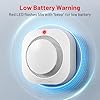When it comes to maintaining a safe home, one of the most important things you can do is keep your smoke detectors up to date. But how often do smoke detectors need to be replaced? The answer may surprise you.
Contents
Why you should replace your smoke detectors regularly?
While it may seem like a hassle to regularly replace the batteries in your smoke detectors or to replace the entire unit every few years, it is a necessary task to help keep your family safe. Smoke detectors have a limited lifespan, and over time, the sensors can become less sensitive, meaning they are less likely to detect a fire in your home. Regular replacement of batteries and smoke detectors is the best way to ensure that your home is safe from fire.
How often you should replace your smoke detectors?
Smoke detectors are one of the most important pieces of equipment in any home, as they can provide an early warning in the event of a fire. It is important to ensure that your smoke detectors are in good working order, as they could mean the difference between life and death in the event of a fire.
There is no definitive answer as to how often you should replace your smoke detectors, as it will depend on a number of factors such as the type of detector, the age of the detector, and the environment in which the detector is located. However, it is generally recommended that you replace your smoke detectors every 10 years.
If you are unsure as to whether your smoke detectors need to be replaced, it is a good idea to check with the manufacturer or your local fire department for guidance.
The signs that it’s time to replace your smoke detector
Your smoke detector is an important part of your home safety plan, so it’s important to know when it’s time to replace it. Here are three signs that it’s time to replace your smoke detector:
1. Your smoke detector is more than 10 years old.
2. Your smoke detector is chirping. This could be a sign that the battery is low or that the unit is malfunctioning.
3. Your smoke detector has been triggered by a false alarm. If your smoke detector goes off for no reason, it could be a sign that it’s time to replace it.
If you’re not sure whether or not your smoke detector needs to be replaced, it’s always best to err on the side of caution and replace it.
How to replace your smoke detector?
batteries
If you have a smoke alarm in your home, it’s important to regularly check and replace the batteries. Here’s how to do it:
- Locate your smoke alarm. If you don’t know where it is, ask your family members or roommates.
- Remove the old batteries.
- Insert new batteries.
- Test your smoke alarm to make sure it’s working.
- Repeat this process every six months.
Smoke detectors are an important part of any home safety plan. By regularly checking and replacing the batteries, you can be sure that your smoke alarm will be there to warn you in the event of a fire.
What to do if your smoke detector is beeping?
If your smoke alarm is beeping, it’s trying to tell you that there’s a problem. The first thing you should do is try to identify the source of the problem. If the batteries are low, replace them. If the batteries are good, but the smoke alarm is still beeping, it may be time to replace the smoke alarm.
How to test your smoke detector?
It’s important to test your smoke detector monthly to make sure it’s working properly. You can test your smoke detector by pressing the test button. If the smoke detector sounds, it’s working. If it doesn’t sound, you’ll need to replace the batteries.
Tips for preventing false alarms from your smoke detector
One of the most important things you can do to protect your home and family from fire is to have working smoke alarms. However, even the best smoke alarm can cause false alarms. To help reduce the number of false alarms, follow these simple tips:
1. Check the batteries regularly. Replace the batteries in your smoke alarm at least once a year, or more often if they start to run low.
2. Clean the smoke alarm regularly. Dust and dirt can build up on the smoke alarm sensor, causing it to trigger false alarms. Use a vacuum with a soft brush attachment to clean the sensor.
3. Be careful when cooking. Smoke from cooking is one of the most common causes of false alarms. If possible, avoid cooking in areas where the smoke alarm is located. If you must cook in an area with a smoke alarm, keep a close eye on the food and be sure to ventilate the area well.
4. Don’t allow smoking in your home. Cigarette smoke is another common cause of false alarms. If someone must smoke in your home, make sure they do so in a well-ventilated area away from the smoke alarm.
5. Keep the area around the smoke alarm clear. clutter around the smoke alarm can prevent it from working properly. Keep the area around the alarm clear of dust, dirt, and other debris.
following these simple tips can help reduce the number of false alarms from your smoke detector, keeping your home and family safe.
Summary
Smoke detectors are an important part of any home safety plan, but like any other piece of technology, they have a limited lifespan. Depending on the type of smoke detector, most will last between 5 and 10 years. However, there are some things that can shorten the lifespan of a smoke detector, so it’s important to be aware of them.
If your smoke detector is more than 10 years old, or if it’s been damaged in any way, it’s time to replace it. Additionally, if you live in an area with a lot of dust or other airborne particles, you may need to replace your smoke detector more often.
Smoke detectors are a vital part of keeping your family safe, so it’s important to make sure they’re in good working order. By replacing them every 5-10 years, you can be sure that your home is always protected.



















